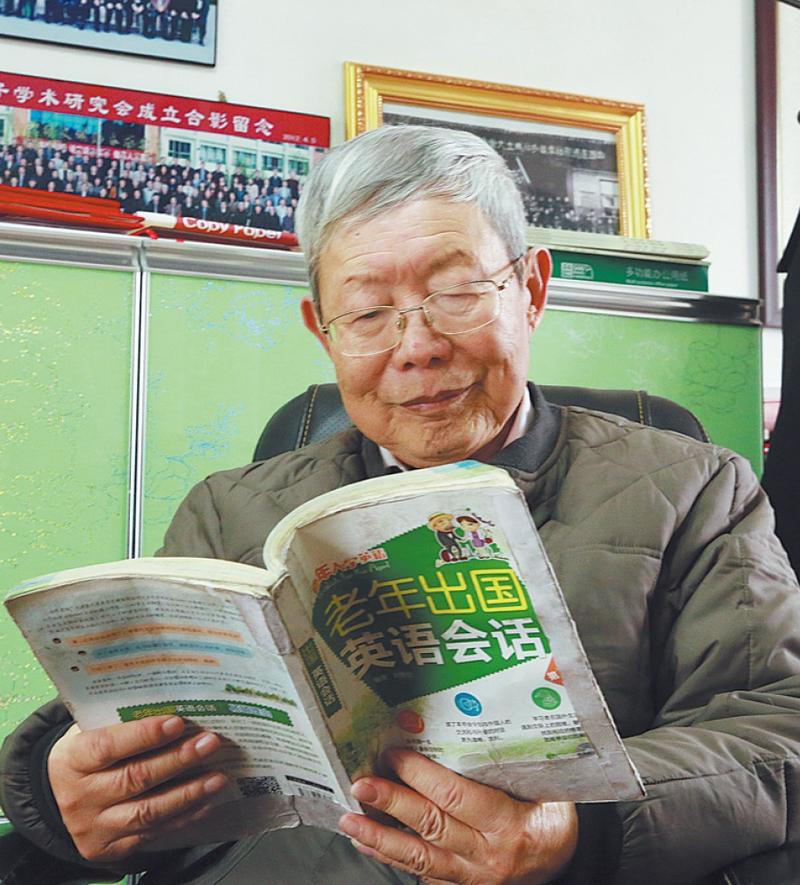 This undated photo shows retiree Zhang Minghe reading the "Oral English for Seniors Traveling Abroad" at his home in Taiyuan, Shanxi province. (PHOTO PROVIDED TO CHINA DAILY)
This undated photo shows retiree Zhang Minghe reading the "Oral English for Seniors Traveling Abroad" at his home in Taiyuan, Shanxi province. (PHOTO PROVIDED TO CHINA DAILY)
On a recent Monday evening, 90-year-old Zhang Minghe held up a worn copy of Oral English for Seniors Traveling Abroad and started a group discussion through an instant-messaging app.
The WeChat group included students ranging in ages from 50 to 70 who are learning English. Zhang, who studies at the College for Seniors at the Taiyuan Open University in Shanxi province, is a volunteer teacher for the online study group.
His notebook is filled with key teaching points he has neatly jotted down. "I teach vocabulary before phrases and passages. I tell them to not only read but also recite the text, which I also do," he said.
English is a universal language. We must, to some extent, grasp a foreign language as we keep opening up and expanding on the global stage.
Zhang Minghe, a retiree living in Taiyuan, Shanxi
Established in January 2019, his group of nine students has three classes a week and has clocked up more than 100 hours of learning. None of them have quit the group.
ALSO READ: Language lessons with a twist prove popular
Student Liu Ze, 72, praised Zhang for his diligence. "He regards helping us learn English as a vocation. He is our role model," Liu said.
Another student Xu Songzhen said: "Some of us are housewives who have a lot of chores to do. Thanks to the encouragement and urging from Zhang, we are able to practice in daily life instead of feeling too shy to speak English."
Student Dong Runmei, 67, said it was difficult to keep up with the English teachers at the seniors' college as she had been poor at the subject since school. "Zhang has shown great patience with me. Now I can have simple conversations in English with my grandchildren," Dong said.
Bright spark
Zhang didn't major in English and was an electrical engineering lecturer at a local university before he retired.
"English is a universal language. We must, to some extent, grasp a foreign language as we keep opening up and expanding on the global stage," Zhang said.
In the beginning, he taught himself English. Zhang later returned to work as a technical translator for a company in Ningbo, Zhejiang province. He retired again at age 75 and furthered his studies of English at the Taiyuan seniors' college.
Zhang has to make a 50-kilometer round trip from his home every day to attend the college in downtown Taiyuan. Due to back and leg problems he has trouble walking and has to use a cane, which makes the journey more inconvenient.
He gets up at 5 am to catch the first bus, then hails a taxi in the city to make sure he arrives for the start of classes at 9 am.
Despite the discomfort the travel causes, Zhang calls it a "sweet suffering" he is willing to endure as "learning is fruitful".
READ MORE: China's proficiency in English hits new high
Many people, including his family, cannot understand why he devotes so much time and energy to studying English.
"They once asked me 'Isn't it enough to live a happy and comfortable life every day? Why do you make it so hard?'," he said. "But I think it's more important for seniors who are free from work and life pressures to make good use of their time to do valuable things they love. Reading and learning are my things."
In 2018, his efforts were rewarded when he won a special encouragement award at the spoken English competition held by the Open University of China in Beijing.
Zhang emerged from the throng of young contestants, stepped on stage with his walking stick and delivered a speech about what open universities meant to him.
He told the audience: "They welcome learners from all over the country, and it opens up a broad path to success for all walks of life and people of all ages in society."
One of the judges said, "The story of Zhang Minghe shows that our country has entered into an era of lifelong learning and Zhang is the model for seniors."
As more elderly people enjoy life after retirement, a growing number of them are showing greater interest in culture, technology and entertainment.
READ MORE: Retiree helps rural students
However, the 76,000 schools for seniors can hardly meet the burgeoning demands. By the end of 2019, a total of 13 million elderly students attended online or offline classes, accounting for 5 percent of the population age 60 and older, according to Xinhua News Agency.
Zhang hopes to continue to play a small but important role in seniors' pursuit of learning. He has set a goal for his students to get rid of their textbooks and start conversing in English.
"Learning is the most meaningful thing in life and we should keep learning till the end," he said.
Contact the writers at zhaoyimeng@chinadaily.com.cn


